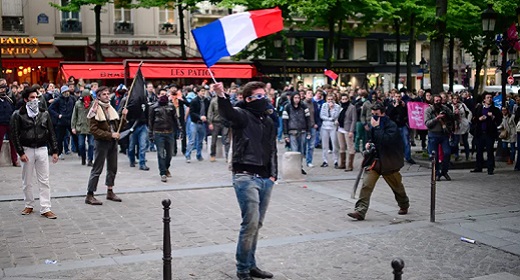by Zack Beauchamp: Blame Unions and history…
Taxi drivers everywhere are unhappy about Uber for encroaching on their business, but the cabbies in France handled that in a particularly French way: by staging mass protests, in which they blocked off roads and even burned tires.
France has a certain reputation for its penchant for protest. It’s not just a stereotype: The country has a long tradition of sometimes-radical political protests, one that goes back to at least the 19th century. That history continues now in part due to the strange nature of French labor unions — they’re both weak and strong at the same time — to make a protest culture that’s quite particular to France.
France’s protest culture started as something other than political
:no_upscale()/cdn.vox-cdn.com/uploads/chorus_asset/file/3843870/GettyImages-3334597.0.jpg)
French students face off with riot police during the 1968 upheaval. (Reg Lancaster/Express/Getty Images)
To understand France’s protest culture today, you need to go back to the 1780s — a little before the 1789 revolution.
Back then, there was a common form of street protest called the charivari: Groups of young men used to go outside the houses of people accused of moral offenses — having sex out of wedlock, for example. They’d bang on pots and pans and demand the accused be “punished,” perhaps by running them out of town or forcing them to pay some money to the assembled crowd.
Over time, something interesting happened to the charivari, according to renowned sociologist Charles Tilly: They got political. By the middle of the 19th century, the gatherings started taking on more political targets, such as corrupt officials or tax collectors. The community might use the protests to express anger not just at that local official, but at the national policy that he represented.
The gradual evolution of local folk traditions into mass political demonstrations explains “how protests became a normal part of French public life,” Johannes Lindvall, a political scientist at Sweden’s Lund University, wrote in 2011. “[It’s] clearly an important part of the explanation for the high level of protest activity in France.”
This charivari, previously a way for a community to enforce moral codes about things like sexuality, became a vehicle for expressing political grievances. But it kept that tradition of the raucous public protest. Tilly sees this as a response to the growth of the French state and capitalism: As French politics became increasingly dominated by a central state and capitalist elites, ordinary people developed a national political consciousness. Their protest tactics shifted accordingly.
Since then, protest has remained a major part of French national life. Major, history-defining events like the May 1968 students protests have made demonstrations into a glamorous, romantic French tradition.
“The French people and their political culture love history and all commemoration of it,” Guy Groux, an expert on French protests at the National Center of Scientific Research in Paris, told Time in 2009. “To the extent that France often looks to its past as much as it does to its future in responding to its present.”
At times, French protests can to some extent be cultural events almost as much as they are political tactics. “Protest and demonstrations in France are perhaps less acts of political participation than political rites, with much the same meaning as Americans pledging allegiance to the flag,” Purdue University’s Frank L. Wilson has written.
Why French labor protests are so big today: France’s strong-weak unions
:no_upscale()/cdn.vox-cdn.com/uploads/chorus_asset/file/3843880/GettyImages-478596826.0.jpg)
Anti-Uber protests by taxi drivers in late June. (Bertrand Langlois/AFP/Getty Images)
Of course, every country has a protest tradition. And it’s not actually clear that France is, in general, that much more protest-prone than your average developed country. Depending on how you look at the numbers, France is either in the middle of the European average in terms of protests, or at the top in metrics such as number of protests and days of work lost to strikes.
But it’s certainly true that protests are more important and more visible in French political life than they are just about anywhere else in the developed world. That has to do with French tradition, but it’s not just that. Another reason for this — which especially applies for labor issues such as the Uber protests — is the paradoxical nature of French unions: They’re both strong and weak at the same time.
According to French labor historian Stéphane Sirot, only about 8 percent of French workers are unionized; the European average is around 25 percent. Yet unions are hugely powerful, owing to laws that give them large stakes in how French companies are managed.
“The political influence of French unions is abnormal,” Radu Vranceanu, research director at the Grande Ecole de Commerce in Paris, told Reuters. “It’s not at all in line with their capacity to mobilize people.”
Because French unions get so much of their clout not from their membership but from favorable laws, which could theoretically be repealed at any time, the unions are paranoid. They’re more willing to fight any policy they don’t like now — because they might not be able to fight in the future.
“They cannot assume that they will be able to mobilise tomorrow just because they are able to mobilise today,” Lindvall wrote.
The fact that French unions are paranoid doesn’t mean that someone isn’t out to get them. Management is aware of the unions’ intrinsic weakness, and so often begins negotiations by taking a pretty hard line. That further incentivizes unions to stage nasty protests rather than trying to hammer it out at the negotiating table.
“French unions must often stage radical action as a prerequisite for obtaining good faith negotiations that big unions in the U.K. and Germany are granted out of hand, out of management’s respect of their power,” Groux said to Time for its story.
Because this is France, there’s an element of history at work. According to the Local, a French publication, “French workers won the right to strike in 1864, 20 years before they were allowed to unionize.”
That meant France developed a tradition of striking and activism before a union hierarchy existed to negotiate on their behalf. Striking was a first resort, rather than a last, and to some extent that’s still in the muscle memory.
“In France, the pattern was power struggle first, then — once everyone had shown their strength — negotiations could begin,” Slate’s Cecile Dehesdin writes. Modern French unions are still shaped by this tradition.
For all of these reasons, then, French unions are more likely to stage radical actions than their peers in other countries. And France’s long protest history means that the French have gotten very, very good at being showy. They know exactly what you need to get media attention, disrupt daily life, and make a splash — as the Uber protests show. Whether this can keep unions in their position of disproportionate strength forever is not clear. But the protests, certainly, will keep happening.


















































